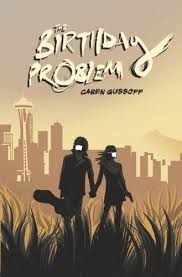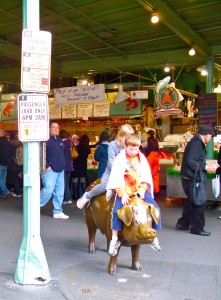
 Start the clock! Release the kraken! Let the hockey players sharpen their blades, let the audience stir restlessly and go one last time for popcorn and sodas and beer, glorious golden beer that tints the ice with its microbrewed haze.
Start the clock! Release the kraken! Let the hockey players sharpen their blades, let the audience stir restlessly and go one last time for popcorn and sodas and beer, glorious golden beer that tints the ice with its microbrewed haze.
Because there is a haze tonight, that’s for sure, folks. Tonight Seattle’s surrendered to the supernatural forces that have been creeping up like uninvited shoggoths in recent years. The world’s gone weird and wacky, and why not krakens, why not tentacles spilling out from the Space Needle, infesting the sky? It’s Seattle, after all; it’s raining so it’s not like they block out the sun.
Who’d have dreamed that magic and hockey would mix this way, a mash-up made of bloody sticks and smashed spell bottles? Seattle’s wizards have come out of hiding for this game, emerged from their lairs in Greenlake and Mercer Island, driven their Teslas over to park in interdimensional folds where they won’t get scratched like normal cars.
Only an hour’s worth of game, and then the magic runs out, deflates like a sodden pumpkin, milked for all that tentacle and terror juice. Will it be enough to keep Seattle entertained for another evening, keep it from imploding like Scherezade in reverse into ennui and coffee beans? Cities don’t resort to supernatural hockey games until they’re really in extremis and no one is really sure what this one will – or even can — achieve, given a world of murder hornets and sapient bananas and well, you remember the last few months as well as I do, particularly what happened to the butterflies.
The clock’s ticking. The skaters are moving back and forth over the ice, and things are stirring in the depths underneath it, things that will fuck a Zamboni up and shred ice like tissue paper. That’s how close the danger is to us all. That’s how dire things are.
Let’s stop now, before another spray of ice goes up, before another player gets a bloody nose and melts the ice with that, so things can crawl through from another dimension. It’s not too late. Where’s the entrance? Where’s the exit? Why does this ice hold me so fast?
...

The Birthday Problem of the title is a common mathematical puzzle: find the probability that, in a group of N people, there is at least one pair of people who have the same birthday. (Hint: it’s a much lower number than you think. You can find out more about it on Wikipedia if you want to understand why.) The book is about odd ties and coincidences, set in a crumbling Seattle in a world plagued by nanobots that make people crazy.
Why’s it instructive to take a look at? Because Gussoff confronts two problems that speculative writers often face. The first is a complicated scientific or mathematical concept, like the birthday problem, which the reader needs to understand. Gussoff manages to convey it to the reader with no “As you know, Bob” or overly pedantic moments.
The second is that it’s constructed in a way that is incredibly hard to do: overlapping points of view, and plenty of them. When you switch POVs, you bounce the reader out of the story just a little, and Gussoff does it in a way that swiftly gathers the reader back in.
I like to include a beginning chunk of the book I’m discussing to show you what the author’s prose style as well as what they set. Here’s the first three paragraphs from The Birthday Problem:
Chaaya wasn’t surprised when she woke up and saw lips aimed directly over her face. It was beginning. It’d been just a matter of time.
It begins with one, good solid hallucination.
That was how it had happened to her Nani.This is how it would happen to her.
Gussoff also makes the most of her setting in a way that will delight Seattleites. There’s a joy to imagining Pike Place Market as a post-apocalytic trading post or the SF Museum hosting a cadre led by an aging rock musician.
If you’re interested in more of Gussoff’s work, she’s got a novella appearing this January from Aqueduct Press, Three Songs for Roxy. Its main character is an alien raised by Romany, and Gussoff draws on her own heritage to create a realistic, unromantic, and absolutely appealing narrative.
#sfwapro
...

Jemina noticed the Very Small Person the moment she entered the train.The child paused in the doorway to survey the car before glancing down at her ticket and then at the other half of the hard wooden bench, high-backed, its shellac peeling, that Jemina sat on. Jemina tucked the macrame bag beside her in with her elbow.
The child was one of the last on, which was why Jemina had been hoping against hope to have the bench to herself, at least all the two day trip to Kansas city. The train began to roll forward, a hoot of steam from the engine, a bell clang from the caboose at the back of the train, the rumble underfoot making the little girl pick her way with extra caution, balancing the small black suitcase in one hand against the pillowy cloth bag in the other.
She arrived mid-car beside Jemina and nodded at her as she struggled briefly to hoist her suitcase up before the elderly man across the man did it for her. She plumped the cloth bag in the corner between sidearm and back and sat down with a little noise of delight as she looked around. Catching herself at the noise, she blushed, fixed her gaze sternly forward as she folded her hands in her lap, and peeped at Jemina sidelong.
Jemina tried to imagine how she might appear. She knew herself thin but nicely dressed and pale-skinned. The lace at her throat was Bruges, the cross around her neck gold. She looked like a school-teacher, she imagined, and not a particularly nice one. She felt her lips thin further at the thought.
The child, interpreting the flattening of Jemina’s mouth for disapproval, fished in her bag and took out a small blackbound Bible. She began to read.
“Oh, it’s all right,” Jemina said. Her boldness surprised her, but this was a child, after all. “I’m Jemina Iarainn and I’m a scientist, headed to work at the War Institute in Seattle. Who are you are where are you going?”
The smile bestowed on her could have lit a room. The Bible slid back into the bag. “Oh thank goodness! I’m Laurel Finch and this is my very first train ride ever, up to Seattle too, and I was hoping I’d have an agreeable companion on my voyage.”
She stumbled a little over the solemnity in the last words. Jemina said, “Trips are much, much nicer with someone to talk to. Where are you going in Seattle? To visit relatives?”
“To the Soldiers’ Orphans’ Home there,” Laurel said, and her mouth drooped before she summoned her smile again. “I’ve been staying with my uncle for the last three years but he is traveling to China as an ambassador. It’s all right, he’ll come back for me, but in the meantime I’m to live there for a few years.”
“Seattle is very nice,” Jemina said. Her mind raced along the years before this child, living among orphans with no chance of adoption herself. Bleak, as bleak as any of Jemina’s childhood years. “You will meet Princess Angeline, Chief Seattle’s daughter. She lives down near the market and is a real Indian princess.”
“Do you know Seattle well?”Jemina shook her head, then nodded. “My twin sister is out there already and she has been writing me long letters.”
“Is she also a scientist?”
“She writes for the newspaper.”
“Oh! Like Nellie Bly!” Laurel clapped her hands and Jemina sighed internally. A daredevil reporter was more exciting than a scientist, but she was the one constructing giant killing war machines, after all, even though she was not at liberty to talk about any of that.
...
 On August 16, 2013, at 8 p.m., Seattle’s Wayward Coffeehouse (6417 N. Roosevelt WAY NE, #104, Seattle, WA) will host a reading of four of the area’s notable speculative fiction writers. Ted Kosmatka, J.M. Sidorova, Django Wexler, and Cat Rambo will read from new and forthcoming work.
On August 16, 2013, at 8 p.m., Seattle’s Wayward Coffeehouse (6417 N. Roosevelt WAY NE, #104, Seattle, WA) will host a reading of four of the area’s notable speculative fiction writers. Ted Kosmatka, J.M. Sidorova, Django Wexler, and Cat Rambo will read from new and forthcoming work.
The four readers share something beyond a love of speculative fiction — they are all represented by the same agent, Seth Fishman of the Gernert Company. After meeting during the Locus Awards recently hosted in Seattle, the four joined forces for a joint reading at the Wayward Coffeehouse. Their work ranges from epic fantasy to hard SF.
About the readers:
...

What makes Seattle particularly well suited to writing speculative fiction set in it?
Kat – Marvelously creepy weather, and distinct neighborhoods that preserve their history. What are ghosts but history that won’t go away?
Julie – The weather for sure, as well as the visual landscape it provides. The distinct neighborhoods with life. Any fiction set in a distinct city is better.
John – The diversity of culture and people as well as the landscape
K.C. – The geography and the weather, which can go from fog to crystal clear one day to the next.
What landmarks of Seattle lend themselves to spec-fic writing?
Kat – Pioneer Square. The first year I was here, an unusual fog struck and all I could see were the disembodied feet of pedestrians moving in it, which inspired all sorts of possibilities writing-wise. Seattle has lots of layers, which are great writing points, the places where the skeleton is partially exposed.
Julie – Seattle has lots of distinctive features. The Greenlake district is really distinctive, but there are lots of different settings that are suited to different moods.
John – The greenness of winter as well as the wilderness and the places to get lost that it provides
K.C. – The whimsical details of the city, such as the five foot concrete dragon in the park near me in West Seattle. I wrote my story, I Must to the Barber’s Chair, because of a sign I’d seen: “Psychic” in one window and “Barber” in the adjoining one. After the story was published, the barber who owned that shop wrote to me. He said the psychic had gone out of business (which you think they would have seen coming) and he’d been moved to buy the “Psychic” sign and add it to his own window.
...

I’m listening to Lady Gaga’s Alejandro and pondering a foray through World of Warcraft with Brightweed the Tauren warrior, who is only a bubble away from leveling, but first I thought I’d catch up with recent news. I’ve got quite a few publications coming out next month, and there’s some that I’m really looking forward to seeing.
In video gaming, I’ve been (as noted) working on WoW. Wayne and I were talking about and agreed that the more we played, the more we were liking this new Cataclysm expansion. The goblin starting area is a ton of fun, even if a little sketchy and unfilled-out in places, archaeology has been not only fun but a clever way for Blizzard to encourage people to go back and explore changed areas, changes to lower level quests in terms of number of things slain quests are well thought out, and the journey from 80 to 85 has been pleasant. I will say that the financial rewards from the water area seems all out of whack compared with, say, the Twilight Highlands.
But enough of that! Here’s some writing-related news.
...
Want access to a lively community of writers and readers, free writing classes, co-working sessions, special speakers, weekly writing games, random pictures and MORE for as little as $2? Check out Cat’s Patreon campaign.

"(On the writing F&SF workshop) Wanted to crow and say thanks: the first story I wrote after taking your class was my very first sale. Coincidence? nah….thanks so much."

(fantasy, short story)
General Aife Crofadottir was acknowledged the greatest military mind of her generation—perhaps even her century. No wonder then that the sorcerer Balthus recruited her early in her career, setting her to rally armies of Beasts and magically-equipped soldiers, planning campaign after campaign, until finally he stood the ruler of a vast expanse of the continent’s northeastern corner. Once fertile lands, once countries, now only uncontested, devastated territories. Three years after her death, she still labored in his service.


This site is protected by reCAPTCHA and the Google Privacy Policy and Terms of Service apply. This site is a participant in the Amazon Services LLC Associates Program, an affiliate advertising program designed to provide a means for sites to earn advertising fees by advertising and linking to Amazon.com.